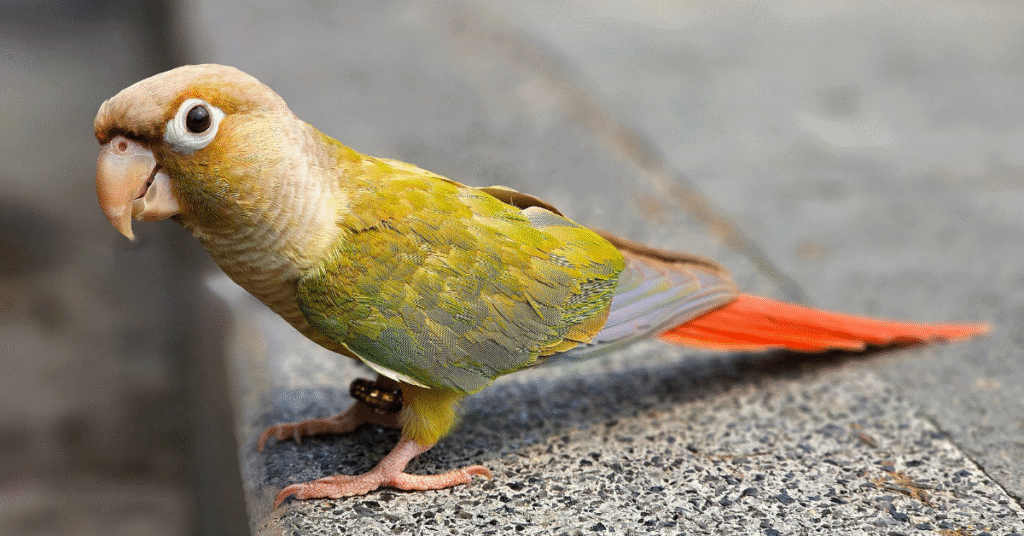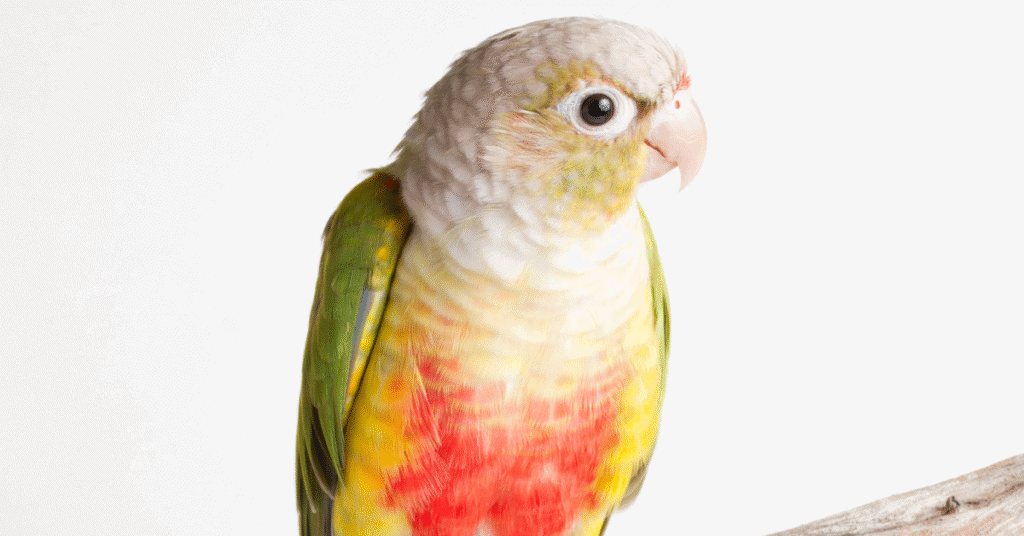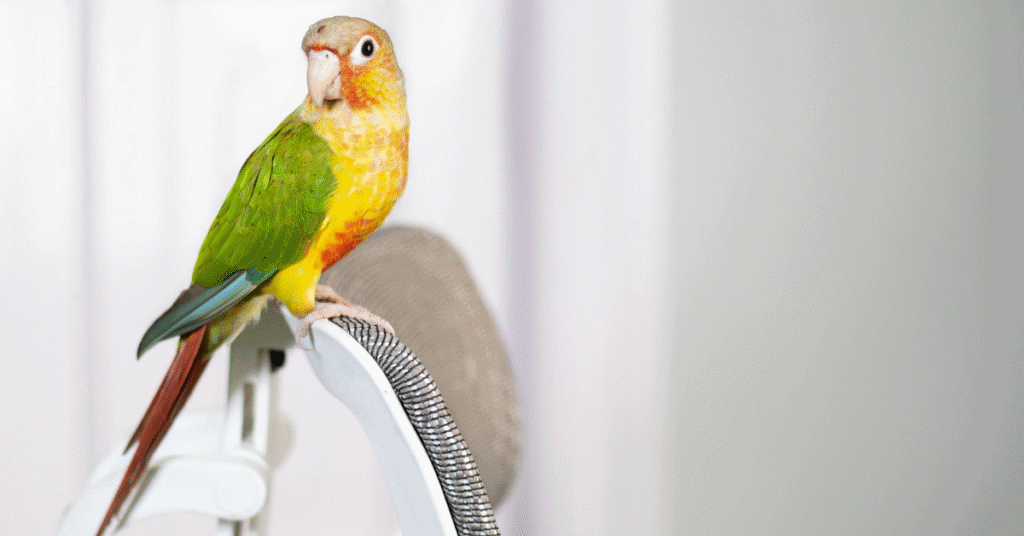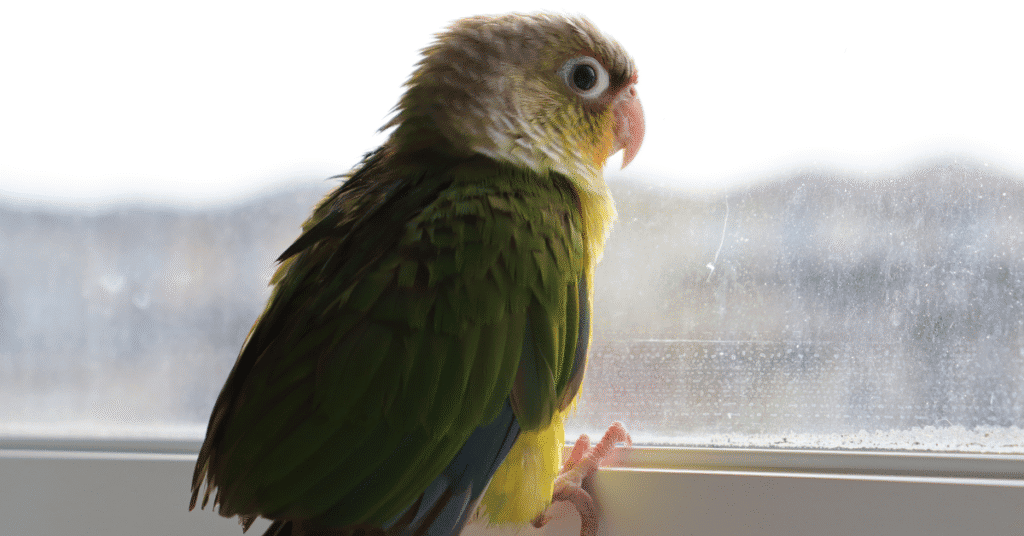Pineapple conures are colorful members of the green cheek conure family with bright yellow and orange feathers on their chest. These small parrots typically grow to about 10 inches long and can live 20-30 years with proper care.
Your pineapple conure has a playful personality that makes it a delightful pet. These birds are known for their curious nature and love to explore their surroundings.
These birds love interaction and will form strong bonds with their human family members. You’ll notice your conure may follow you around the room or even try to participate in your activities.
Common Pineapple Conure Behaviors:

- Head bobbing when excited
- Beak grinding when content
- Regurgitating food (a sign of affection)
- Fluffing feathers when relaxed
Pineapple conures are intelligent birds that need mental stimulation. They can learn tricks and even some words, though they aren’t known for extensive talking abilities.
These birds can be moody at times. You might notice your conure has moments of high energy followed by quiet time for rest.
Young conures may go through a “bluffing” stage around 6-12 months of age, where they become temporarily more nippy and territorial. This is normal developmental behavior that usually passes with patience and consistent handling.
Creating a Comfortable Habitat

Your pineapple conure needs a friendly home that provides safety, companionship, comfort, and enough space to thrive. Check out our guide on bird safety tips, so you know how to parrot-proof your home!
A well-designed habitat supports both physical and mental health for your colorful companion.
Choosing the Right Cage
The cage for your pineapple conure should be spacious enough for wing-stretching and play. Look for a cage at least 24″ x 24″ x 30″ with bar spacing between 1/2″ to 3/4″ to prevent escapes. But a bigger cage is always recommended. Just make sure the bar spacing is safe for a conure before you use it.
Cage placement matters! Position the cage in a family area where your bird can feel included, but avoid kitchens (cooking fumes are dangerous) and drafty areas. Keep the cage away from direct sunlight and air vents.
Your conure will appreciate a cage with horizontal bars for climbing. Square or rectangular cages offer more usable space than round ones.
Ensure the cage has a secure door latch that your clever conure can’t figure out!
Essential Accessories
Perches are vital for foot health and exercise. Include different diameters (1/2″ to 1″) and textures. Natural wood perches like manzanita or dragonwood help keep nails trimmed naturally. But you may want to visit your veterinarian to help with nail trims.
Line the cage bottom with plain or unscented paper for easy cleaning. Change it daily to maintain hygiene and prevent odors.
We have an entire article dedicated to bird cage lining ideas.
You must put food and water dishes away from perches to avoid contamination. Stainless steel bowls are best as they’re durable and easy to clean.
Add support items for mental stimulation:
- Toys that encourage foraging
- Swings and ladders for exercise
- A birdbath for bathing fun
- Shreddable items like cardboard or paper
Rotate toys weekly to keep your pineapple conure engaged and prevent boredom.
Feeding Your Pineapple Conure

Proper nutrition is essential for keeping your pineapple conure healthy and happy. A balanced diet will support their vibrant feathers, energy levels, and overall well-being.
What to Feed Your Conure
Your pineapple conure needs a varied diet to thrive. First check out our guide on all kinds of parrot pelles and how to get your bird to eat them.
Start with high-quality pellets as the foundation, making up about 60-70% of their daily food. Pellets are formulated to provide balanced nutrition. You can find some like TOPS brands that are good for conures.
Fresh fruits and vegetables should comprise 20-30% of their diet. Good choices include:
- Fruits: apples, berries, bananas, mangoes, and yes, small amounts of pineapple!
- Vegetables: carrots, broccoli, bell peppers, leafy greens, and sweet potatoes
Wash all produce thoroughly and remove seeds from fruits like apples. Cut foods into small, manageable pieces for your bird.
The remaining 10% can be seeds and nuts. While these are high in fat, they make great training treats! Offer them sparingly to avoid weight gain.
Understanding Nutritional Needs
Pineapple conures have specific nutritional requirements that you should keep in mind. Calcium is crucial for Conure’s bone health, especially for female birds that may lay eggs. Cuttlebone or mineral blocks can provide supplemental calcium.
Vitamin A supports a Conure’s eye health and immune function. Orange, red, and dark green vegetables like carrots, sweet potatoes, and kale are excellent sources.
Protein is important for feather development. Small amounts of cooked egg or nuts can help meet this need.
Always provide fresh, clean water daily. Change it frequently as conures may dunk food in their water.
Avoid chocolate, avocado, caffeine, and alcohol as these are toxic to birds. Also, do not give high-salt and high-sugar foods, which can cause health problems over time.
Enrichment and Exercise

Pineapple conures need daily mental and physical stimulation to stay happy and healthy. These active birds thrive when given plenty of opportunities to play, exercise, and learn new skills.
Interactive Playtime
Your pineapple conure needs at least 2-3 hours outside its cage daily for exercise and social interaction. Set up a play gym with different perches, swings, and ladders to encourage climbing and movement. Rotate toys regularly to prevent boredom.
Puzzle toys filled with treats make great exercise tools. Your bird will work physically and mentally to retrieve the rewards inside. Try hiding treats in paper cups or cardboard tubes for simple enrichment.
Flying is an excellent exercise for conures. Ensure your bird has safe flying space in a bird-proofed room. Remove ceiling fans, close blinds, and keep toxic plants away during flight.
Pineapple conures often enjoy water play. Try offering a shallow bathing dish or misting your bird with a spray bottle. This activity provides both exercise and feather care.
Training for Mental Stimulation
Training sessions are perfect for mental exercise. Start with simple tricks like “step up” before moving to more complex behaviors like turning around or waving. Keep sessions short (5-10 minutes) but do them daily.
Use positive reinforcement with favorite treats and plenty of praise. Clicker training works well with conures – the click marks the exact moment of correct behavior.
Target training is the simple act of teaching your bird to touch a stick with their beak. It builds focus and can lead to more advanced tricks. Training sessions also strengthen your bond while providing mental exercise.
Teaching your conure to forage for food mimics natural behaviors. Hide bits of food in crinkled paper or specialized foraging toys to encourage problem-solving skills and physical activity.
Health and Wellness
Keeping your pineapple conure healthy requires regular veterinary care and being alert to signs of illness. Early detection of health problems can make treatment more effective and less stressful for your bird.
Routine Vet Visits
Find an avian veterinarian for your pineapple conure before bringing your bird home. Schedule a check-up within the first week after adoption to establish a baseline for your bird’s health.
Annual exams should include physical examinations, weight checks, and blood tests. Your vet may recommend testing for common avian diseases like psittacosis or polyomavirus.
Between visits, weigh your bird weekly using a small digital scale. Sudden weight loss can indicate illness before other symptoms appear.
Ask your vet about vaccination recommendations. Some conures benefit from polyomavirus vaccines, especially if they attend bird shows or live in multi-bird homes.
Recognizing Signs of Illness
Pineapple conures are masters at hiding illness. By the time symptoms are apparent, they may be seriously sick. Watch for subtle changes in behavior or appearance.
Common warning signs include:
- Fluffed-up feathers when it’s not cold
- Sitting at the bottom of the cage
- Changes in droppings (color, consistency, frequency)
- Decreased appetite or water consumption
- Discharge from nostrils or eyes
- Sneezing or wheezing
- Tail bobbing when breathing
Check your bird’s droppings daily. Normal droppings have three parts: a solid green or brown part, a white urate portion, and sometimes clear liquid urine.
If you notice any concerning symptoms in your Pineapple Conure, don’t wait to see if they improve. Contact your avian vet immediately. Respiratory issues are especially urgent and require same-day attention.